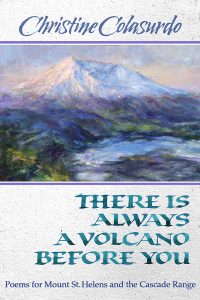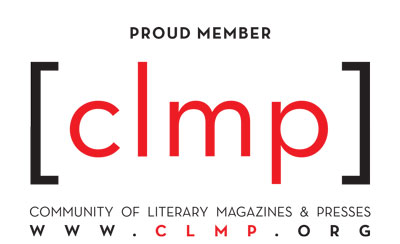 “Loowitlatkla” by Christine Colasurdo, posthumously published in There Is Always a Volcano Before You, released in November 2025, has been nominated for the Pushcart Prize. To choose our nominees this year was especially challenging, for we published 31 books, including 1,080 poems in total. Among all of these amazing and moving poems, this poem continues to be one of my favorites.
“Loowitlatkla” by Christine Colasurdo, posthumously published in There Is Always a Volcano Before You, released in November 2025, has been nominated for the Pushcart Prize. To choose our nominees this year was especially challenging, for we published 31 books, including 1,080 poems in total. Among all of these amazing and moving poems, this poem continues to be one of my favorites.
I love how this poem keeps expanding into new metaphor with each rich description of the volcano. Each time I read it, I gain a new appreciation for Mt Saint Helens and that ominous eruption in 1980.
Please enjoy the poem, and feel free to leave a comment.
Loowitlatkla
by Christine Colasurdo
Everybody knows mountains can’t read,
capped by lenticular clouds, licked by rivers.
But I send my words to the mountain anyway—
words like salmon eggs heaped at creek bottom,
words like ravens released from a long night’s breathing,
words like the tiny pink trumpets of twinflowers
tooting their perfume to the ants and bees.
Lawetlat’la. Sounds like water.
Sounds like the echoes of tongues long accustomed
to ocean, rain, dew, marsh, lake, stream.
Droplets fall from fir boughs smacking my forehead.
Lawetlat’la: Cascade Mountain.
I was born with a dream of the volcano,
old hump of earth peeping through hospital windows
to where I beached, slippery and screaming.
Mountains don’t peep any more
than they can read, though I woke to milk
and milkshake rivers trickling under glaciers
whose sweat described the heat of the sun.
Loowitlatkla: is that the old woman wheezing
over smoldering coals at Tamanawas Bridge
or the dimple-faced virgin in love with her own skin?
Is she heavy as old andesite or light as new snow?
Kind as a grandmother or vain as a teenager?
Or perhaps the volcano is both and neither—
old as a precocious girl, young as a grinning octogenarian,
admitting nothing, the way mountains do.
The stories never say if she had children.
They never speak of her in middle age,
only that she tended fire and fostered fire
and doomed and saved her nation.
Years ago the mountain was my grandmother,
gave me huckleberries to eat when I was seven,
chewy thimbleberries whose leaves I used as hankies,
beady salmonberries gold and plump as summer.
Berries are the mountain’s tart blood:
snowberries, soapberries, dewberries, bunchberries,
elderberries red and blue, blackcaps and salal,
and the petite poisonous blue berry
of the queen’s-cup bead lily,
petals white as a winter crevasse.
With berries she gave me black bears
snorting and heaving, slinking past the family
tent to upturn metal cans and rustle up watermelon rinds,
barbecued-chicken bones, stiff right angles of bread crusts
soaked in stale mayonnaise and mustard.
But maybe the mountain is a young woman after all,
a young woman in love with stars on lake water,
clutches of wildflowers, meditations, guitars
whose music drifts over night’s black waters,
like those underground rivers at the volcano’s heart,
those runnels of superheated ground water flashing
to steam in an instant so half the face cascades
like a broad and deafening waterfall,
like rough bark from a rotting snag
like dreams from an adolescent
who must shrug off childhood
for a paved and dutiful world.
Lawetlat‘la. Smoking Mountain.
Sounds like harmonic tremor, fizzing of magma,
rhythms long played beyond understanding,
an unseen rising for fools’ disbelief.
The summer before the eruption
I felt the volcano shudder—rattling cabinets,
shaking worn floors of a timbered lodge.
I didn’t know it was the future
crouching like a cougar.
Lawetlat’la: Sounds like the past going under—
a burning of osprey, voles, chipmunks, martens,
a suffocation of spiders, steelhead, bobcats, ptarmigans,
a drowning of otters, beaver, salamanders, mink,
a ripping of cedars, cottonwoods, hemlocks, alders,
a blocking of rivers, storm of lightning, plume of darkness,
landscape of fire, a crushing of all places
under rock, ice, wood, water, corpses, mud.
Loowitlatkla. Destroyer and destroyed,
she who covers by uncovering,
reveals by concealing, closes by disclosing.
Can we know the difference
between a word not yet said and silence—
those moments of calm between
cudgels of thunder on backcountry days?
Smooth water pools silently above a large fall.
Some mountains sputter and die.
One day that soft hot belly will harden—
like drowned logs slowly petrifying
in a lake smashed and dammed.
Compared to the volcano my own
life is less than a spatter of stones
skittering down that old Dogs Head dome
to break an afternoon’s long silence,
a grain of pulverized dacite
lost among landslides.
Lawetlat’la: Sounds like all things—
dying and rising, sweetness and violence,
a slow accretion of Earth’s molten meanings.
I want to know how the volcano carves
a pond out of its profile to collect rainwater,
how it fashions a furnace in the grip of a glacier,
how it catches clouds on summer mornings
and loses them to wind and crater dust.
For it seems that mountain is everywhere—
lies buried in cells, flies like a god to distant places,
bubbles up like spring water deep beneath willows,
sings in cracks no human can hear.
Nothing escapes the volcano—
it senses the long ropes of cedar roots sinking,
sneaking like snakes through pumice;
it hears fir needles breathe, their stomata
sighing like little accordions in the subalpine air;
it knows how long each tree will live.
I breathe because it lets me.
Lawetlat‘la. Sounds like something
crashing through brush, like deer sniffing
for shrubs beyond the sedges, like a ladder
of arrows shot up to the moon,
the trickle of an old cycle starting anew.
Tadpoles burst the seams of blast-zone lakes,
cutthroat fingerlings dart downstream,
chickarees screech and whip their tails,
elk lumber past ponds where newts have mated,
marmots creep along blasted logs whose tips
swing off ledges high in the air, even the trillium
blooms and dies as though nothing has happened,
as though nothing might ever happen again.
The past is a pocketful of pumice
I have tried to piece together.
Everybody knows mountains can’t talk
but now the volcano flaps her fireweed quilts
and whispers how the bats love her evening light.
These words might burn before I hike
past timberline in morning.
—-Note—-
*Loowitlatkla: A 19th century Indian-white term for Mount St. Helens. Versions include Loo-wit Lat-kla, Tah-one-lat-clah and Lawetlat’la. The word Loowitlatkla first appeared in print in 1860.
from There Is Always a Volcano Before You by Christine Colasurdo (The Poetry Box, 2025)
nominated for The Pushcart Prize by Shawn Aveningo Sanders, editor/publisher



Leave a Reply